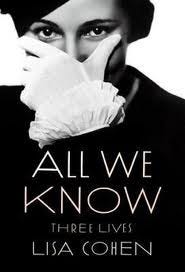Books & Culture
Review: All We Know, by Lisa Cohen

by Courtney Maum
Deliberations on success, art, and legacy, as illustrated by a trio of highly unconventional women

Lisa Cohen’s All We Know: Three Lives is an ambitious exploration of the life and times of three notable women: Hollywood personality Mercedes De Acosta, groundbreaking designer Madge Garland, and the entirely unclassifiable Esther Murphy. All were openly gay, all had famous lovers, and all were subject to more than their fair share of reversals of fortune, vertiginous swoops from glamorous heights to depraved depths, sham marriages, world wars and financial ruin.
But it’s not a mere juicy tell-all (though juicy it certainly is). For every sexy bombshell Cohen drops, there’s a nearly academic line of inquiry: What can be said to be the legacy of a person who left nothing tangible behind? Can a psychosexual obsession have lasting value? Where is the dividing line between art and commerce? What is success?
Her most enigmatic subject is the brilliant, alcoholic pedant and “bachelor heiress” Esther Murphy. Driven by a hyper-rational logorrhea that attracted many great thinkers and drove her lovers insane, Murphy’s unstoppable flow of discourse on politics and history marked her entire life. At times, it feels as though Cohen is over-determined to protect Murphy’s failure to produce any tangible achievements by blaming the customs of her times. And the portrait comes across, in places, as exhaustively overstuffed with information as Murphy was herself. But once you have heard Esther Murphy out on the topics of Marxism and the Restoration, you may proceed to Cohen’s unbelievably compelling second subject.
There’s simply no getting around it: celebrity gossip, even of the type that is yellowing with age, is simply riveting. And gossip was the inevitable byproduct of Mercedes De Acosta’s obsessive habit of archiving the liaisons — some fantasized, many more consummated — with the actresses she worshipped. Among the artifacts she intentionally left for posterity is a love poem Isadora Duncan wrote for her: “My kisses like a swarm/ of Bees/ would find their way/ between thy knees/and suck the honey/of thy lips/Embracing thy/too slender hips.” Red-hot blushes aside, De Acosta’s “rebellion against the mediocre, the prudish” in the wake of the First World War was wholehearted and vividly courageous, and even her emotional kinks (of which there were many) make for engrossing reading.
Designer Madge Garland once said of dresses that they “depend for their charm on the graceful movements of a supple body beneath.” In that light, fashion is indivisible from the person wearing it. It was because of this, not despite it, that Garland’s approach to clothing captivated some of the finest writers, painters, designers and photographers of her time. Weak and frail as a child, shy to the point of crippling paranoia, and referred to as “charmless” by her parents, Madge McHarg — renamed Garland at Gertrude Stein’s suggestion — remade herself by sheer will into one of the world’s great innovators in fashion. Her first lucky break (there were unlucky ones to follow) was to land a job at British Vogue at a time when the magazine was promoting a now-unimaginable roster of emerging talent: Huxley, the Woolfs and the Bells, Picasso, Edith Sitwell, and Man Ray, to name a few. But All We Know isn’t a simple roll call. Cohen invites us to witness the artistic process: Virginia Woolf, for example, in the wake of a photo shoot which Garland supervised, excitedly struggling to articulate what she called “frock consciousness” — an encounter which led to her short story “The New Dress.”
It is in relating Garland’s life that Cohen’s gift most shines. It’s a gift for transmitting to us the value of lives that, seen through the narrow spyglass of patriarchal standards, are generally dismissed as not having substance.
Gertrude Stein, musing on fashion in Tender Buttons, wrote: “A line distinguishes it. A line just distinguishes it.” This is precisely how Cohen illustrates the influence of these three lives: spinning web-like connections between one mind and another, showing how one source of inspiration moves out in concentric circles, wider and wider and wider.
Recommended if you liked: Fanny and Stella: The Young Men Who Shocked Victorian England by Neil McKenna, Truly Wilde: The Unsettling Story of Dolly Wilde, Oscar’s Unusual Niece by Joan Schenkar, Behind the Screen: How Gays and Lesbians Shaped Hollywood, 1910–1969 by William J. Mann
***
— Jenna Leigh Evans writes fiction in Brooklyn. You can find her here.









